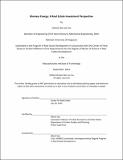Biomass energy : a real estate investment perspective
Author(s)
Foo, Chester Ren Jie
DownloadFull printable version (2.832Mb)
Other Contributors
Massachusetts Institute of Technology. Center for Real Estate. Program in Real Estate Development.
Advisor
Albert Saiz.
Terms of use
Metadata
Show full item recordAbstract
A central consideration in real estate is how value is created in real estate development and investment deals. A biomass power plant is not only an asset which generates revenues, but from a real estate perspective, it also creates additional value to the owners' existing farmlands. Biomass energy assets are similar to traditional real estate and infrastructure in a lot of ways. On the other hand, biomass energy assets are characterized by the feedstock fuel and multiple revenue generators such as sale of power, carbon credits and biomass ash. Furthermore, favorable regulatory policies make biomass energy assets more distinct and attractive. The current biomass investment market is a relatively young and evolving market. Southeast Asia has a huge potential for biomass investment. The market players are mostly dominated by investors and firms with specialized technical knowledge about renewable energy and/or traditional power production, and private equity and venture capital firms are not very active in this market. The lack of technical insight and information transparency are stopping these financial institutions from entering the market. Therefore the Biomass Valuation Model (BVM), developed in Excel®, allow the critical technical and financial components to communicate effectively, which would help to determine the viability of the biomass investment projects with greater certainty. The BVM would be able to generate financial outputs from the perspectives of real estate development, financial and economic conditions, and the biomass power generation technical process. This valuation model (BVM) would be helpful to investors, considering the amount of time and effort required in overcoming the technical barrier, hence providing investors the "first-mover" advantage in tapping into the biomass investment market.
Description
Thesis: S.M. in Real Estate Development, Massachusetts Institute of Technology, Program in Real Estate Development in conjunction with the Center for Real Estate, 2014. This electronic version was submitted by the student author. The certified thesis is available in the Institute Archives and Special Collections. Cataloged from student-submitted PDF version of thesis. Includes bibliographical references (pages 75-76).
Date issued
2014Department
Massachusetts Institute of Technology. Center for Real Estate. Program in Real Estate Development.; Massachusetts Institute of Technology. Center for Real EstatePublisher
Massachusetts Institute of Technology
Keywords
Center for Real Estate. Program in Real Estate Development.